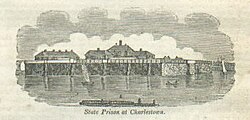 Charlestown State Prison in 1840 Charlestown State Prison in 1840 | |
| Location | Charlestown, Boston, Massachusetts |
|---|---|
| Coordinates | 42°22′29.11″N 71°4′3.24″W / 42.3747528°N 71.0675667°W / 42.3747528; -71.0675667 |
| Status | Closed |
| Security class | Correctional facility |
| Population | 992 (as of 1903) |
| Opened | 1805 |
| Closed | November 1955 |
| Managed by | Massachusetts Department of Correction |
| Street address | Austin Street and New Rutherford Avenue |
| City | Charlestown |
| State/province | Massachusetts |
| Country | United States |
Charlestown State Prison was a correctional facility in Charlestown, Boston, Massachusetts operated by the Massachusetts Department of Correction. The facility was built at Lynde's Point, now at the intersection of Austin Street and New Rutherford Avenue, and in proximity to the Boston and Maine Railroad tracks that intersected with the Eastern Freight Railroad tracks. Bunker Hill Community College occupies the site that the prison once occupied.
In 1803 the Massachusetts General Court passed an act approving the construction of a prison. The prison opened in 1805. In 1828 the construction of a north wing was underway. The construction of the south wing occurred in 1850. In 1853 the Legislature of Massachusetts voted to build a prison to replace Charlestown. The prison's space increased as time passed. By 1867 the state converted a guardroom into hundreds of prison cells. On the morning of April 10, 1873, an Englishman named William Patterson, who was incarcerated for burglary, stabbed a turnkey named John E. Shaw. Shaw's injuries were so severe that he was not expected to live.
Gideon Haynes had fourteen years of service as warden of the prison about the time of the Civil War, and later (in the late 1870s) as superintendent of the Charlestown property when the prison in Concord opened. One of his children, Inez Haynes Irwin, became a noted suffragist, feminist, and writer. The Haynes family lived at 85 Chapman Street, a street that no longer exists.
The new prison, MCI Concord, opened in May 1878. Many prisoners were transferred to the new prison. Governor of Massachusetts George D. Robinson signed a bill ordering prisoners to be moved back to Charlestown on May 21, 1884. In 1886 the west wing, with nearly 60 cells, was built in Charlestown. In 1890 a prisoner named Moore escaped. During the same year "Chicken" Walsh, another prisoner, made an unsuccessful attempt to escape. At a later point a prison riot occurred.
By 1903, of the prisoners at Charlestown, 75 were in life imprisonment, 54 had varying terms, and 863 were held under minimum and maximum sentence forms. In 1920 Charlestown began manufacturing and issuing license plates. The prison closed in November 1955, and prisoners were moved to other facilities.
Notable prisoners
- James Allen
- Warry Charles
- John Patrick Connolly
- Ezra Heywood
- Victor Folke Nelson
- Charles Ponzi
- Jesse Pomeroy
- Malcolm X
- Sacco and Vanzetti
- Norman H. White
See also
References
- G. W. Bromley & Co., Atlas of the City of Boston. Vol. 6, Charlestown and Brighton: From Actual Surveys and Official Records (Boston: Geo. W. and Walter S. Bromley, 1885), Outline & Index Map and Plate D, State Library of Massachusetts Real Estate Atlas Digitization Project, https://archives.lib.state.ma.us/handle/2452/205558
- ^ Barbo, Theresa Mitchell. The Cape Cod Murder of 1899: Edwin Ray Snow's Punishment and Redemption. The History Press, 2007. 29. Retrieved from Google Books on May 23, 2010. ISBN 1-59629-227-X, 9781596292277.
- Goldsmith, Larry. "History from the inside out: prison life in nineteenth-century Massachusetts." Journal of Social History. Northern hemisphere Winter of 1997. 1. Retrieved on May 23, 2010.
- ^ Around the Block. Massachusetts Department of Correction. "Volume 6, Issue 1. January 2010. 3 (3/4). Retrieved on May 23, 2010.
- "ATTEMPTED MURDER IN PRISON.; A Turnkey in the Charlestown Prison Stabbed by a Convict." (Full PDF article) The New York Times. Wednesday April 10, 1873. Page 5. Retrieved on May 23, 2010.
- Edith Haynes Thompson, “Inez and I,” c. 1964-1965, on file, Scituate Historical Society.
- "CONVICTS IN OPEN REVOLT; A DESPERATE FIGHT IN THE CHARLESTOWN PRISON. GUARDS USE THEIR CLUBS AND RIFLES FREELY -- A STRONG FORCE OF POLICE SUMMONED." (full PDF article) The New York Times. Wednesday August 8, 1890. Page 1. Retrieved on May 23, 2010.
- "History of the Plate." Massachusetts Department of Transportation. Retrieved on January 2, 2017.
- Jay, Mike (November 5, 2020). "The Hide That Binds". New York Review of Books. 67 (17): 51.
- "Warry Charles Dies in Prison". The Boston Daily Globe. August 10, 1915.
- "Connolly, Conway Lose Court Pleas and Start Terms". The Boston Daily Globe. April 9, 1941.
- "She Is a Riddle to Them" Angela Tilton Heywood's Sex Radicalism in a Framework of Traditional Womanhood".
- Merrill, Anthony. "The Man Who Broke Charlestown". Boston Sunday Advertiser Green Magazine. December 17, 1939.
- "Movie Made Escaped Convict Go Back to Charleston Prison". The Boston Sunday Post. December 17, 1939.
- Zuckoff, Mitchell, “Ponzi’s Scheme: The True Story of a Financial Legend” (NY: Random House, 2005), 307
- Gribben, Mark. "Jesse Harding Pomeroy". Crime Library. 17. Resurrection Archived October 4, 2011, at the Wayback Machine. Retrieved on November 27, 2010.
- "Malcolm X--Man of Violence". Chicago Tribune. February 22, 1965. 2. "Arrested in Boston after a series of bur- , he was sent to the state prison at Charlestown."
- Bruce Watson, Sacco and Vanzetti: The Men, the Murders, and the Judgment of Mankind (NY: Viking, 2007), 76, 82, 254–5, 308
- "White Sentenced to State Prison". The Boston Daily Globe. October 9, 1928.
External links
- Prison Days and Nights, memoir by 1920s Charlestown prisoner Victor Folke Nelson
- [REDACTED] Media related to Charlestown State Prison at Wikimedia Commons
| State prisons |
|
|---|---|
| Defunct |
|